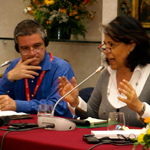The Devil’s Advocate: Pros and Cons for the need of Foreign Correspondents
 Interview with Charlie Beckett, director of the LSE journalists’ organization POLIS
Interview with Charlie Beckett, director of the LSE journalists’ organization POLIS
Charlie Beckett, director of the London School of Economics journalists’ organization POLIS. He was the moderator of the panel discussion called the Death of the foreign correspondent.
You were the devil advocate and spoke about the reasons behind the decreased number of foreign correspondents. Can you share them with our readers?
“I was the devils’ advocate because of course I do think is important that we have journalists about the rest of the world. But perhaps I believe quite sincerely that there are problems about the way we do it.”
1. The price
“It is very expensive, to send people from here, from our country to somewhere else. It is quite slow as well.”
2. The fame chasing
“The trouble as well is that person you send can often be a lot more interested in their own ego, than the story. They want to be seen, especially the TV reporters, they want to be seen or heard and they want of be the star of an exciting situation. They are often chased after the most dramatic bangs and most awful human stories, rather than trying to explain what is really happening.”
3. Neocolonialism perspective
“And when they do explain there is sometimes kind of neocolonialism of their mind and by that I mean instead of really try to understand what is happening, they will just tell the audience what are they interested in about that kind of place.”
4. New technologies
“And then of course finally it is all about new technologies: why are we sending all of these people across somewhere else to report on the world when we can use new technology to hear from the people who live there and from their journalists as well. Why don’t we spend more money on supporting journalists in those places and using them to tell us the news about where they are?”
What are the pros to keep the foreign correspondent role?
“I think that what will happen is that those foreign correspondent will become much more networked and of course is not a choice between one or the other. You will end up with correspondents who are much more networked, they are much more abled to tap into the social media and the traditional media in the places they go to. There will be much more of a partnership. And at the same time I think we will simply use more journalists as we heard from Peter Horrocks from the BBC – how they are using more journalists from those places.”
You are running a think thank organization called POLIS together with the London School of Economics. Can you tell us a bit more about that and the conference that you are going to held in June?
“POLIS is the London School of Economics journalists’ think thank. I am a journalist and I went there to set it up and run it. We do a lot of research, but we also do a lot of public events because we are there to be a forum for debate about the future of journalism around the world. We are very interested in how journalism changes and what affect that has.”
The Value of Journalism Conference, London 2011: Media and Power
“So in June on our annual conference, we will have a lot of journalists mainly speaking about media and power, which is the topic because of what is happening in north Africa and the Middle East, the role of traditional journalism-people from BBC and Al Jazeera, but also the role of social media in its impact on politics. How do we hold business to account, how do we hold politicians to account, how do we hold and criticize anybody in authority and what is the role of media in doing that. That is what we are going to talk about in June. In a few weeks we will be starting to do the ticketing and the conference is free and it will be open for everybody.”
Dobriyana Tropankeva
